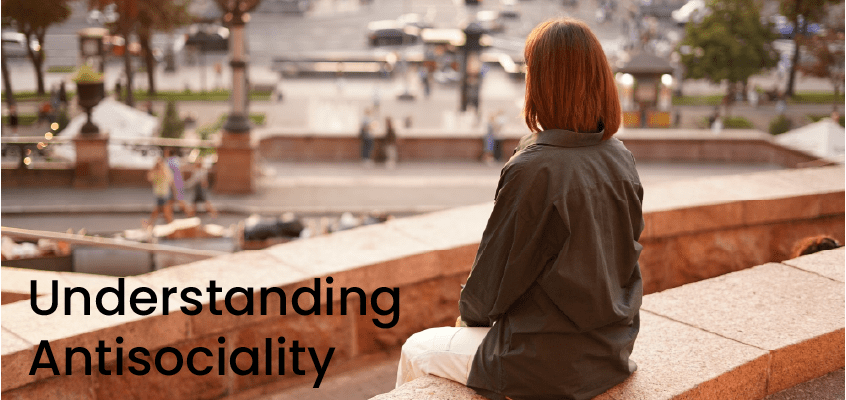Introduction
When you think of the word ‘antisocial’, you probably think of that awkward kid who sits alone at lunchtime and is overly shy towards others. Maybe you remember a teacher who would label students’ antisocial’ if they didn’t respond in class. However, these are all surface-level characteristics that don’t even begin to delve into what it means to be antisocial in today’s world. Antisocial behaviour is more than being shy or reclusive; it is a broad spectrum of behaviours that can manifest negatively in many ways. Antisocial individuals often have problems with trust and regard for others, leading to further complications such as isolation and depression. People with antisocial personality disorder (ASPD) exhibit these traits so frequently that they may initiate distrust in those around them. This article will explore the ugly side of antisociality and how it can affect your life if you exhibit these qualities frequently.
What does being antisocial mean?
This article will focus on the negative side of social behaviour – antisocial or not engaging in appropriate social behaviours. When most people think of being antisocial, they think of someone who is reclusive and doesn’t want to be around others. However, antisociality can manifest in many ways, such as avoiding friends, family, and social activities.
Some individuals are so antisocial that they cannot have meaningful interactions with others. They may have trouble understanding and following social rules, such as taking turns when someone else is speaking or knowing how to respond to people appropriately. These individuals may also be impulsive and aggressive towards others and use alcohol or drugs to calm their anxieties in social situations.
How can antisocial behaviour affect you?
Most people who exhibit antisocial behaviour aren’t diagnosed with ASPD, but some general traits could indicate you are on the path toward developing a more severe condition. Antisocial behaviour can cause problems in your personal and professional life. Let’s look at some ways it can affect you:
● Bad work/relationship outcomes: Antisocial people may have trouble following timelines and keeping deadlines and may have a more challenging time working in a team. It can lead to poor performance reviews and missed opportunities for promotion.
● Lack of trust: If you have trouble trusting others and are antisocial, it cannot be easy to form or maintain relationships with others.
● Depression and anxiety: Having difficulty making friends and feeling isolated can trigger depression. Feeling depressed can make breaking out of antisocial patterns of behaviour even harder.
● Poor health: If you’re antisocial, you may not attend the doctor or eat a healthy diet. It can lead to a higher risk of developing diabetes and cancer.
● Substance abuse: Drinking alcohol and using drugs is a common way people with antisocial behaviour try to calm their anxiety, leading to substance abuse problems.
The dangers of being antisocial
Another sign that you might be exhibiting antisocial behaviour is if you’re putting yourself in dangerous situations. Keep an eye out for the symptoms listed below so you can take action and make a change before the problem gets worse.
● Risky sexual behaviour: If you don’t form meaningful relationships with other people, you may be more likely to engage in risky sexual behaviour, leading to sexually transmitted diseases, unplanned pregnancies, and other complications.
● Illegal activities: Some antisocial people try to escape their anxiety and social discomfort by engaging in substance abuse or illegal activities. It can lead to legal troubles that can affect your life for years.
● Aggressive and violent behaviour: Not all antisocial people exhibit this trait, but some can have outbursts of aggression and violence. It can lead to assault charges and even murder.
Why is it so hard to stop antisocial behaviour?
Many people engage in antisocial behaviour because they struggle with anxiety and don’t know how to cope. It can cause them to lash out at others or shut themselves off from social situations.
It’s important to remember that everyone sometimes feels anxious and out of place, a natural part of being human. However, some people have such frequent and debilitating anxiety that they can’t function normally. It can cause them to engage in antisocial behaviour, leading to a dangerous cycle of social isolation and poor health.
If you feel you or someone you know is exhibiting antisocial behaviour, it is essential to seek help before the situation worsens. You can start by listing ways to cope with anxiety; this can be as simple as writing positive affirmations or taking deep breaths when feeling anxious.
How to recognise if you have a problem with antisocial behaviour
If you are concerned about your antisocial behaviour, there are a few warning signs to look out for.
Trouble forming relationships with others
Feel depressed or anxious often, or notice you engaging in risky behaviours.
Suppose you think you may have a problem with antisocial behaviour. In that case, seeking help to make a change for the better is essential, starting with meeting with a therapist to help. Identify the source of your anxiety and work with you to find healthy ways to manage it. You might also benefit from joining an online support group where you can share your experiences with others dealing with similar struggles and learn ways to cope.
Conclusion
When you think about antisocial behaviour, the critical thing to remember is that there is a difference between being shy or reclusive and being antisocial. Many introverted or reclusive individuals will resent being called antisocial, and these words can cause harm to those who need support and help the most.
However, if you think you have antisocial traits or have a friend or family member who you believe exhibits these traits, it’s essential to seek help before they spiral further out of control. Remember that you are not alone, and support is always available.











